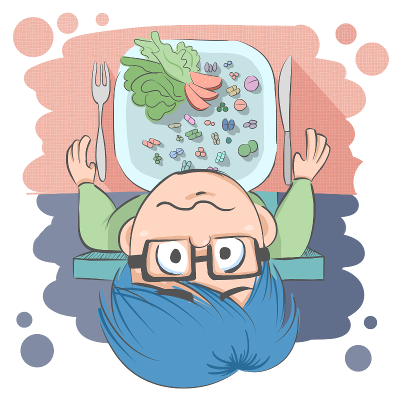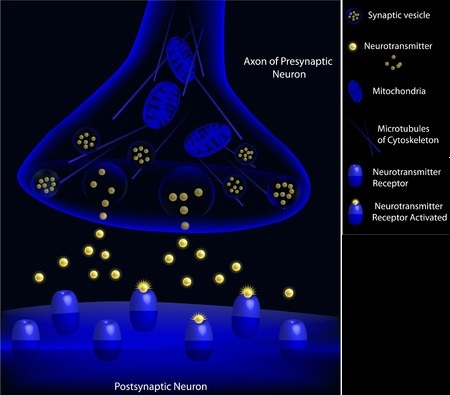Home > Mental care principles > #1 Medications
#1 Medications and Supplements
Part 1: Basic principles

Psychiatric medications
Medications and supplements are chemical substances. A chemical substance that changes one's brain function is called a psychoactive drug. The reason behind using medications for mental care is to use psychoactive drugs to biochemically control how you feel and think. Such treatment should only be necessary for disabling problems that cannot be regulated by other modes of mental care. In practice, however, medications are far more commonly prescribed than is necessary. [1]
Psychiatric medications are psychoactive drugs that act on chemical messengers in our body called neurotransmitters and hormones. [2] Neurotransmitters travel across synapses, while hormones travel through the circulatory system from glands to target organs.
For example, a chemical substance called Benzodiazepines (BZD) is known to enhance the effect of a neurotransmitter called gamma-aminobutyric acid (GABA). BZD is now one of the most common medications for treating anxiety. [3]
Enhancing the effect of neurotransmitters (serotonin, norepinephrine, and dopamine) has been hypothesized to reduce the symptoms of depression. A concept born in the 1950s called "the monoamine hypothesis of depression" postulates that a deficit of certain monoamines is responsible for certain features of depression; therefore, increasing the level of monoamines would result in improved alertness, energy, attention, motivation, and pleasure. [4]
Almost all antidepressants used today are based on this hypothesis; however, the hypothesis has not actually been proven. Limitations have been uncovered, and the medications' efficacy has been criticized. [5]
In the U.S., prescription and over-the-counter medications are regulated and must be approved by the Food and Drug Administration (FDA) to be marketed.

- NIMH, the National Institute of Mental Health is a good resource for details on psychiatric medications. Link
- For further search and exploration, use the search keywords "psychiatric medication."
[1] Mojtabai R. Olfson M. Proportion Of Antidepressants Prescribed Without A Psychiatric Diagnosis Is Growing. Health Affairs. 2011;30(8):1434-1442. Link
[2] Psychiatric medication. Wikipedia. Retrieved on May 13, 2016 Link
[3] Benzodiazepine. Wikipedia. Retrieved on May 13, 2016 Link
[4] Lopez-Munoz F. Alamo C. Monoaminergic neurotransmission: the history of the discovery of antidepressants from 1950s until today. Curr Pharm Des. 2009;15(14):1563-86. Link
[5] Biology of depression. Wikipedia. Retrieved on May 13, 2016 Link
Supplements
Dietary supplements are also chemical substances, but the goal is to provide nutrients, not treatment. The definition of dietary supplements as described by the FDA is as follows:
"A dietary supplement is a product intended for ingestion that contains a "dietary ingredient" intended to add further nutritional value to (supplement) the diet. A "dietary ingredient" may be one, or any combination, of the following substances: a vitamin, a mineral, an herb or other botanical, an amino acid, a dietary substance for use by people to supplement the diet by increasing the total dietary intake, and a concentrate, metabolite, constituent, or extract." [6]
Consumers should be aware of the following fact regarding supplements. The FDA recognizes supplements as foods and "does not have the authority to review dietary supplement products for safety and effectiveness before they are marketed." [7]

- This FDA website provides details on dietary supplements. Link
- Psychology Today has a good read on dietary supplements in mental health care. Link
- Did you know that caffeine is the most widely consumed psychoactive drug in the world? Link
- For further search and exploration, use the search keywords "dietary supplements mental health."
[6] What is a dietary supplement? FDA. Retrieved on May 13, 2016 Link
[7] Dietary Supplements: What You Need to Know. FDA. Retrieved on May 13, 2016 Link
